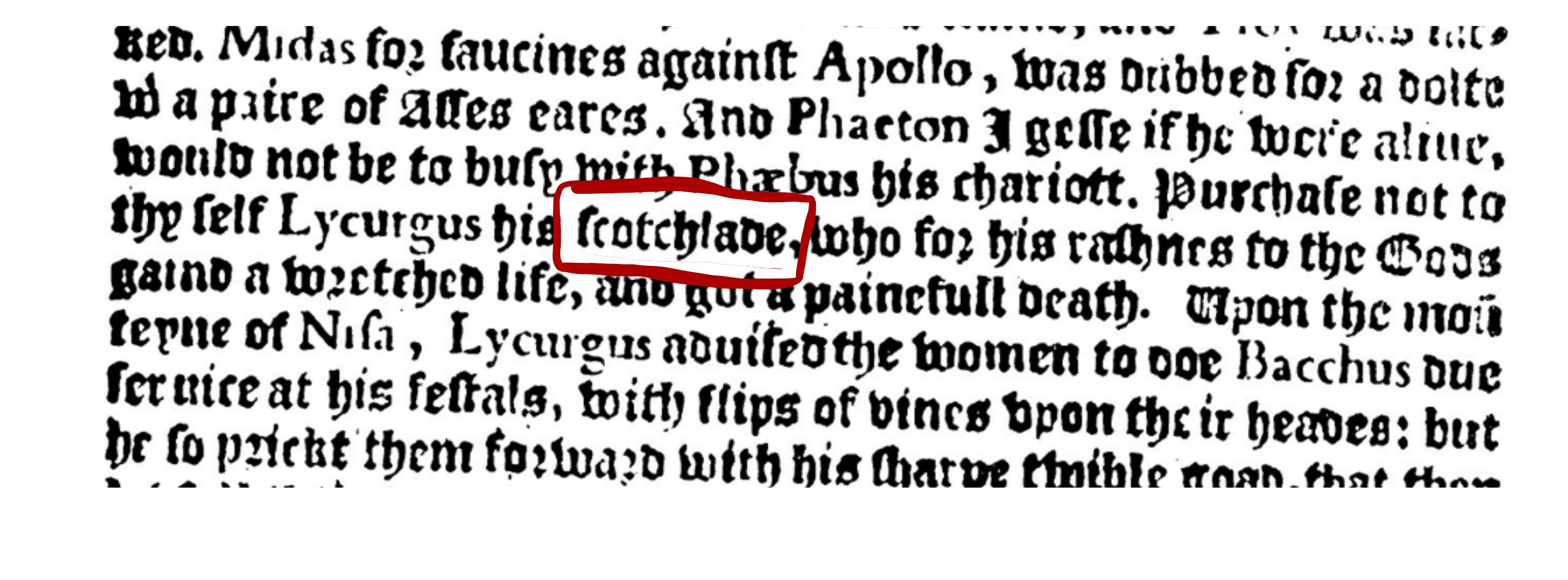I found the following passage from a work called Philotimus, which dates back to 1583. Though most of the language in the book is relatively understandable after a bit of squinting and rereading, this one has been stumping me:
Beware of Ioue and lightning, and fly far from them. Though Venus were assistant to Paris his adherentes, yet for contempte of Iunoes demaunde, both Paris was slaine, and Troy was sac∣ked. Midas for faucines against Apollo, was dubbed for a dolte wt a paire of Asses eares. And Phaeton I gesse if he were aliue, would not be to busy with Phaebus his chariott. Purchase not to thy self Lycurgus his scotchlade, who for his rashnes to the Gods gaind a wretched life, and got a painefull death. Vpon the moū¦teyne of Nisa, Lycurgus aduised the women to doe Bacchus due seruice at his festals, with slips of vines vpon their heades: but he so prickt them forward with his sharpe twible goad, that they let fall their holy crownes, whereat he did reioyce and sport his fill: yea more then this, to disgrace the God himselfe, he thunde∣red out his threats, and caused him to fly to escape his snares: at this offence the Gods did loure, and forthwith did reuenge the same in bereauing Lycu•g of his sight for a certaine tyme, and to punish him aright, and fulfill their will at ful, in setting wreak∣full date to his wicked life.
With contemporary orthography, that'd be something along the lines of:
Beware of Joves and lightning, and fly far from them. Though Venus were assistant to Paris his adherents, yet for contempt of Juno's demand, both Paris was slain, and Troy was sacked. Midas for faucines against Apollo, was dubbed for a dolt with a pair of asses' ears. And Phaeton I guess if he were alive, would not be to busy with Phaebus his chariot. Purchase not to thy self Lycurgus his scotchlade, who for his rashness to the Gods gained a wretched life, and got a painful death. Upon the mountain of Nisa, Lycurgus advised the women to do Bacchus due service at his festivals, with slips of vines upon their heads: but he so pricked them forward with his sharp twible [?] goad, that they let fall their holy crowns, whereat he did rejoice and sport his fill: yea more than this, to disgrace the God himself, he thundered out his threats and caused him to fly to escape his snares: at this offense the Gods did loure [?], and forthwith did revenge the same in bereaving Lycurgus of his sight for a certain time, and to punish him aright, and fulfill their will at full, in setting wreaked full date to his wicked life.
I get the general idea, but that individual sentence is confusing. The key seems to be 'scotchlade,' but I can't figure out what it means. (The word doesn't appear again in the text.) It sort of looks to be a compound of 'scotch' and 'lade,' and the connection to Dionysus kinda supports that. But this seems to be a bit of a stretch; I also can't find '-lade' as a derivation in any list of Middle/Early Modern English suffixes, except for this one, which has '-laden' meaning 'loaded.'
So, what's a 'scotchlade,' and what does that sentence mean?
Edit: here's the original text, with scotchlade emphasized. Perhaps that'll help. It certainly looks fairly ambiguous, in that that characters could be interpreted fairly different, but nothing really jumps out at me.

